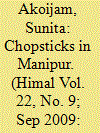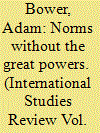| Srl | Item |
| 1 |
ID:
090560


|
|
|
|
|
| Publication |
2009.
|
| Summary/Abstract |
In September 2000, a separatist group known as the Revolutionary People's Front banned the screening of Hindi films in the state, along with the distribution of all Hindi satellite channels. Terming Hindi films to be a form of cultural imperialism, the group said that Bollywood was undermining the culture of Manipur. Soon there was no trace of Hindi films, television serials, song sequences or even songs on radio stations in Manipur. Except for the government-controlled Doordarshan, all satellite channels broadcasting Hindi films and Hindi serials quickly disappeared.
|
|
|
|
|
|
|
|
|
|
|
|
|
|
|
|
| 2 |
ID:
141288


|
|
|
|
|
| Summary/Abstract |
In the past two decades, a series of major multilateral treaties were created in the absence of support—and often in the face of sustained opposition—from the United States and other emerging global leaders like China, India, and Russia. These institutions present a puzzle to prominent theories of IR because they fail to encompass predominantly powerful actors regarded as most consequential to the development and enforcement of international rules, raising questions as to their potential efficacy. This paper addresses the prospects for non-great power law in theoretical and empirical terms. I first draw on constructivist conceptions of international law as a social practice to demonstrate how multilateral treaties may generate powerful new social expectations and alter behavior even when they do not correspond to the prevailing distribution of material power in the international system. Treaties are embedded within an international social system composed of legal and non-legal elements, and these structural features generate social pressures that bear on formal members and non-parties alike. I then apply this account to an archetypal—and hard—case, the ban on antipersonnel mines. Contrary to skeptical assumptions, I demonstrate that the Mine Ban Treaty has instantiated a powerful new international social standard which has generated widespread behavioral change among treaty members—challenging accounts that emphasize enforcement by leading states—and non-parties including major military powers like the United States—challenging the view that great powers avoid new institutional developments not to their liking.
|
|
|
|
|
|
|
|
|
|
|
|
|
|
|
|
| 3 |
ID:
099667


|
|
|